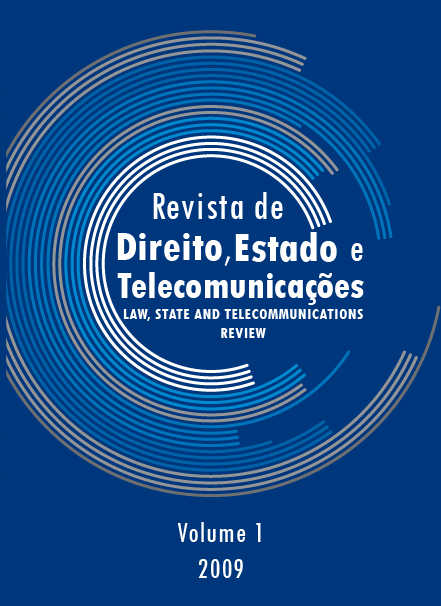Política de comunicações dos Estados Unidos pós-convergência
DOI:
https://doi.org/10.26512/lstr.v1i1.21735Schlagwörter:
política de comunicações, Estados Unidos, pós-convergência, direito de publicar, direito de intercâmbio privado, direito de conceber plataformas de comunicaçãoAbstract
Os sistemas de comunicações estão convergindo, mas a política de comunicação tem evoluído no sentido de submeter as diferentes mídias a diferentes doutrinas. Muitas das soluções para uma política de comunicação pós-convergência são ajustes à s categorias regulatórias herdadas do passado. Em vez de seguir com essa tendência, este artigo revisita os objetivos subjacentes de formulação de políticas públicas de todas as mídias. Em primeiro lugar, este artigo apresenta um modelo conceitual para a política de comunicação como um processo de inércia marcado por crises. Em segundo lugar, ele aplica esse modelo a uma brevíssima história dessa política nos Estados Unidos, enfocando a imprensa, os correios, a telefonia, a radiodifusão e a internet. Em terceiro lugar, a partir dessa análise, o artigo propõe abordagens úteis num ambiente resultante do processo convergente, distinguindo-se três metas políticas subjacentes: o direito de publicar, o direito de intercâmbio privado, e o direito de conceber plataformas de comunicação.
Literaturhinweise
BAR, F., S. Cohen, P. Cowhey, B. DeLong, M. Kleeman and J. Zysman (2000) ‘Access and Innovation Policy for the Third-Generation Internet’, Telecommunications Policy 24(6”“7): 489”“518.
BENIGER, J.R. (1986) The Control Revolution: Technological and Economic Origins of the Information Society. Cambridge, MA: Harvard University Press.
BENIGER, J.R. (1987) ‘Personalization of Mass Media and the Growth of Pseudo-community’, Communication Research 14(3): 352”“71.
CABINET COMMITTEE ON CABLE COMMUNICATIONS (1974) Cable ”“ Report to the President (‘The Whitehead Report’). Washington, DC: GPO.
CHANDLER, A.D. (1977) The Visible Hand: The Managerial Revolution in American Business. Cambridge, MA: Belknap Press.
ESBIN, B. (1998) Internet Over Cable: Defining the Future in Terms of the Past, OPP Working Paper Series 30. Washington, DC: Federal Communications Commission.
FCC (1969a) ‘Memorandum of Opinion and Order’, Docket 18397, 23 FCC 2d 825. Washington, DC: FCC.
FCC (1969b) ‘First Report and Order’, Docket 18397, 23 FCC 2d 825. Washington, DC: FCC.
FISCHER, C. (1987) ‘“Touch Someone”: The Telephone Industry Discovers Sociability’, Technology and Culture 29(1): 32”“61.
HILL, R.S. and G.B.N. Hill (1880) The Life of Sir Rowland Hill and the History of Penny Postage. London: T. De La Rue and Co.
HORWITZ, R.B. (1989) The Irony of Regulatory Reform: The Deregulation of American Telecommunications. New York: Oxford University Press.
INFORMATION INFRASTRUCTURE TASK FORCE (1994) Administration White Paper on Communications Act Reforms. Washington, DC: Department of Commerce.
LESSIG, L. (1999) Code and Other Laws of Cyberspace. New York: Basic Books.
LUBRANO, A. (1997) The Telegraph: How Technology Innovation Caused Social Change. New York: Garland.
MCCHESNEY, R. (1993) Telecommunications, Mass Media, and Democracy: The Battle for the Control of US Broadcasting, 1928”“1935. New York: Oxford University Press.
MELODY, W.H. (1996) ‘Toward a Framework for Designing Information Society Policies’, Telecommunications Policy 20(4): 243”“59.
MUELLER, M. (1997) Universal Service: Competition, Interconnection, and Monopoly in the Making of the American Telephone System. Cambridge, MA: MIT Press.
NEUMAN,W.R., L.W. McKnight and R.J. Solomon (1997) The Gordian Knot: Political Gridlock on the Information Highway. Cambridge, MA: MIT Press.
POOL, I. de Sola (1983) Technologies of Freedom. Cambridge, MA: Belknap Press.
POSTMASTER-GENERAL (1890) An Argument in Support of the Limited Post and Telegraph by the Postmaster-General Together with Certain Appendices Relating to Postal Telegraphy. Washington, DC: Government Printing Office.
SAWHNEY, H. (1994) ‘Universal Service: Prosaic Motives and Great Ideals’, Journal of Broadcasting and Electronic Media 38(4): 375”“95.
SMULYAN, S. (1994) Selling Radio: The Commercialization of American Broadcasting, 1920”“1934. Washington, DC: Smithsonian Institution Press.
STREETER, T. (1996) Selling the Air: A Critique of the Policy of Commercial Broadcasting. Chicago: University of Chicago Press.
UNITED STATES POSTAL SERVICE (1938) A Brief History of the United States Postal Service. Washington, DC: Government Printing Office.
VAN CUILENBURG, J. and P. Verhoest (1998) ‘Free and Equal Access: In Search of Policy Models for Converging Communication Systems’, Telecommunications Policy 22(3): 171”“81.
VIETOR, R.H.K. (1994) Contrived Competition: Regulation and Deregulation in America. Cambridge, MA: Belknap Press of Harvard University Press.
VOGEL, S.K. (1996) Freer Markets, More Rules: Regulatory Reform in Advanced Industrial Countries. Ithaca, NY: Cornell University Press.
WILLIAMS, R. (1966) Communications. London: Chatto and Windus.
Downloads
Veröffentlicht
Ausgabe
Rubrik
Lizenz
By submitting this paper to the Law, State and Telecommunications Review,
I hereby declare that I agree to the terms of the Creative Commons Attribution 4.0 International (CC BY 4.0).


